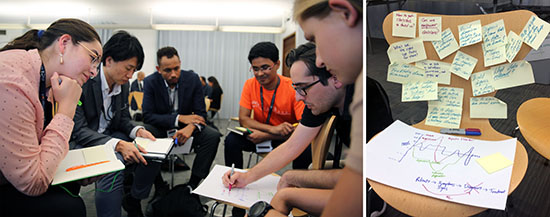Authors: Anja Thieme, Danielle Belgrave, Akane Sano, Gavin Doherty
Posted: Fri, November 01, 2019 - 11:33:18
As part of the ACII 2019 conference in Cambridge (U.K.), we ran a workshop on “Machine Learning for Affective Disorders” (ML4AD). The workshop was well attended and had an extensive program, from an opening keynote by UC Irvine assistant professor of psychological science Stephen Schueller, to presentations by authors of accepted workshop papers, to invited talks by established researchers in the field. Topics and application areas included: detection of depression from body movements; online suicide-risk prediction on Reddit; various approaches to assist stress recognition; a study of an impulse suppression task to help detect people suffering from ADHD; and strategies for generating better “well-being features” for end-to-end prediction of future well-being.

Keynote by Stephen Schueller.
Discussions at the workshop touched on many common ML challenges regarding data processing, feature extraction, and the need for interpretable systems. Most conversations, however, centered on: 1) difficulties surrounding mental health assessment, and 2) ethical issues when developing or deploying ML applications. Here, we want to share a synthesis of these conversations and current questions that were raised by researchers working in this area.
Mental Health Assessment
Workshop attendees described a range of assessment challenges including: data labeling and establishing “ground truth,” definitions of mental health targets, or what measures were considered as “safe” to administer to study participants or people who are perhaps self-managing their condition in everyday life. Two areas of debate received particular attention:
What healthcare need(s) to target and how to conceptualize mental health states or symptoms. In the types of ML tools or applications that are being developed, we noticed a predominant focus on the detection and diagnosis of mental health symptoms or states. This may partly be explained by the availability of data and clinically validated tools in this space, which inform how research targets are shaped. Currently, much of the existing ML work tries to match the data that is available about a person to a diagnosis category (e.g., depression). Here, attendees mentioned concerns that looking at a mental illness, like depression, as one broad category may not take into account the variability of depression symptoms and how the illness manifests, and could mean building models for monitoring depression that are less useful as a result. Further, they raised the question of whether mapping a person to a “relevant treatment” might present a more important ML task than diagnosis.
Related to this discussion, attendees raised some other key questions:
- What is the health/medical problem that we are trying to address? Are we asking the right questions?
- How do we ensure that the (often complex) models/solutions we develop in computing science really meet a clinical need? What are the “right” use cases for ML?
- How can we define/select/develop good quality measures?
The value of objective vs. subjective assessments. Do they need to compete with each other? Excitement about passively and continuously captured data about peoples’ behaviors through sensors or content created online has shaped perceptions of ML approaches as providing “more objective” insights; especially when compared to other “more subjective” methods such as self-reports. It was pointed out that we cannot strictly define what is subjective or objective. Thus, instead of looking at these approaches in competition, perhaps a more promising route would be to look at interesting relations that surface through the combination of different data methods, and what each may say about the person. Rather than looking at ML insights, clinical expertise, and traditional health assessment tools in competition, how can they complement each other? This leads us to ask how ML outputs can serve as a useful information resource to assist, and help empower, clinicians. When discussing examples such as mobile phone-based schizophrenia monitoring, it was apparent that providing clinicians with a wealth of automatically collected patient data was likely to be overwhelming and of little use unless the data was presented in ways that provided meaningful insights to clinicians, and effectively complemented their work practices.
Thus, key questions included:
- How can we empower clinicians through data tools?
- How can we help clinicians to appropriately trust data and related generated insights?
- How can the results of ML help make concrete actions/interventions for clinicians/patients?

Workshop participants discussing assessment challenges.
Ethical Challenges
Inevitably, when discussing the role of ML and possibilities of ML-enabled interventions for use as part of real-world mental health services, our conversations turned to ethical issues, specifically the following two themes:
(How) should we communicate ML-detected/diagnosed mental health disorders or risks? A key conversation topic was: if, and how, we should communicate to people that a ML application has diagnosed them with a mental health disorder or detected a risk. This was particularly a concern in contexts where people are perhaps unaware of a mental health problem and the processing of their data (e.g., from social media) for diagnostic purposes. On the one hand, being able to detect problems (early) can help raise awareness, validate the person’s experience, encourage help-seeking, and allow for better management of a condition. On the other hand, people may not want to be “screened” or “diagnosed” with a psychiatric condition due to the associated stigma and its implications on their personal or work life. For example, a diagnosis of a mental disorder can have severe consequences for professionals in the police force or firefighting. Thus, how do we balance both peoples’ “right to be left alone” and “right to be helped”?
Related questions were:
- How do we sensibly communicate the detection/diagnosis of a mental health problem or disorder?
- Should only passive data be collected and used for self-reflection and self-care of the person?
- How do we show risk factors to people in ways that are actionable (e.g., a diagnosis alone may not be helpful unless the person knows what they can do about it)?
- What kinds of interventions should not be developed or tested with people in the wild?
What are the broader implications of ML interventions and how can we reduce risks of misuse? It is hard to predict what unanticipated consequences a new ML intervention might have on a person, their life, or society at large. Partly this is due to the way in which we tend to study well-defined problems whose solutions may not transfer to other contexts outside of those for which they’ve been designed or trained. For example, in the context of developing an emotion recognizer based on a person’s facial expressions, we discussed what the implications might be if someone was repurposing this technology, for example, to identify children who are not working enough at school, or employees who appear less productive at work. Additional ethical concerns included: difficulties in preventing the (mis)use of developed tools with low clinical accuracy in clinical practice; and challenges related to user consent and data control.
Key questions included:
- How do we responsibly design and develop ML systems?
- How can we help reduce the risk of misuse for the technologies we develop?
- How do we rethink consent processes and support user control over their data?
We thank all organizers, keynote and invited speakers, paper authors, and attendees for their invaluable contributions to the workshop.
Posted in: on Fri, November 01, 2019 - 11:33:18
Anja Thieme
View All Anja Thieme's Posts
Danielle Belgrave
View All Danielle Belgrave's Posts
Akane Sano
View All Akane Sano's Posts
Gavin Doherty
View All Gavin Doherty's Posts







Post Comment
@smith1213 (2024 12 11)
This piece delves into an essential intersection of technology and human well-being. Exploring the ethical implications of using machine learning for mental health assessment is not only timely but necessary as AI’s role in healthcare expands. The article could benefit from concrete examples of potential biases in existing systems and how they might impact vulnerable populations. Additionally, discussing frameworks or principles for ethical AI development in mental health could further enhance the practical value of the reflections. Looking forward to seeing how you balance technical insights with ethical considerations! Best Chiropractor Richmond Hill
@aiphotography (2025 02 06)
Reflections on mental health assessment highlight the importance of accurate, compassionate evaluations to understand an individual’s emotional and psychological well-being. Just as honista atualizado offers an enhanced, seamless experience for its users, a thoughtful mental health assessment provides clarity and insight, ensuring that support systems can be tailored to meet the unique needs of each person.